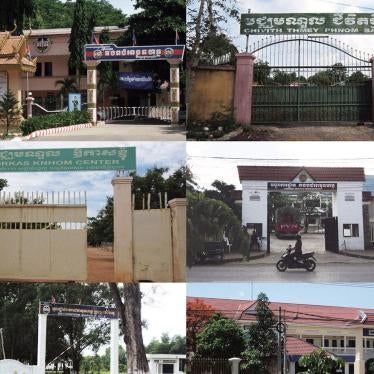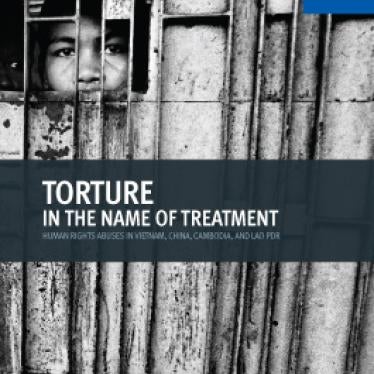|
Commentary
Chinese Addiction Study and Human Rights
Study Conducted on Detainees in Compulsory Drug Centers
Published in:
Science
In the Report "A memory retrieval-extinction procedure to prevent drug craving and relapse" (13 April, p. 241), Y.-X. Xue et al. describe experiments conducted on rats and drug users in Beijing, China. Although the authors state that the study participants gave written informed consent and that the research was approved by the Human Investigation Committee of the Peking University Health Center, substantial questions about ethical protections remain.
The authors do not mention that Beijing Ankang and Tian-Tang-He Drug Rehabilitation Center, where their study participants reside, are compulsory treatment centers run by the Beijing Municipal Public Security Bureau and the Beijing Municipal Bureau of Justice (respectively), historically housing people detained without due process. Over the past few years, Chinese compulsory treatment centers have also begun accepting voluntary patients. The specific dates on which the research was conducted and whether the study participants in Xue et al.’s paper were voluntary patients or held under administrative detention are not clear from the Report, nor is the standard of drug dependency treatment provided in either center.
According to a 2010 article in China Daily, drug users arrested by the police typically spend 2 years at the Beijing Ankang drug detention center, engaged in nonstandard “therapies” such as boxing, art, sand-play therapy, and “traversing rope and chain bridges.”[1] The center is staffed, according to the article, by 20 psychologists “working … alongside 30 policemen.” An older news article from 2004 described a hierarchy of forced labor at the center.[2]
Less information is available about the Tiantanghe compulsory rehabilitation center, but another China Daily article, from 2009, reported that “patients are asked to live in quarantine,” and showed photos of yoga classes taught by police officers and detainees hitting and kicking dummies.[3] These too cannot be considered evidence-based or best practices in drug-dependency treatment.
Research in compulsory drug detention centers that detain drug users for long periods and operate outside of judicial oversight deserve strict scrutiny. Xue et al. do not explain what the “usual” treatment provided to individuals in the drug detention centers entails, nor do they specify the average length of detention. If, as has been previously reported, the “usual” treatment is unproven and non–evidence-based care, the study authors should address the ethical implications of those conditions. Furthermore, in labeling the participants as “patients” and the detention center as a “hospital,” the authors risk legitimatizing the centers, and mischaracterizing study participants and the conditions under which the research was undertaken.
Since 2005, Human Rights Watch has conducted a series of investigations into access to HIV prevention and treatment for intravenous drug use in China,[4] as well as conditions in compulsory drug detention centers.[5] We and others have found a wide range of severe human rights abuses in so-called drug treatment or rehabilitation centers,[6][7] in violation of international human rights law.[8] Recognition of these abuses has led to international calls for the closure of compulsory drug detention centers, including by the Executive Director of the Global Fund to Fight AIDS, Tuberculosis, and Malaria,[9] and in a recent joint letter by 12 UN agencies.[10]
In response to a 2011 Human Rights Watch report on drug detention centers in Vietnam that found similar conditions to what we have previously reported in China,[11] the heads of the U.S. National Institute for Drug Abuse (NIDA) and the White House Office of National Drug Control Policy wrote that these conditions “not only would violate NIDA’s principles of drug treatment, but also would infringe upon internationally recognized human rights.”[12] Two of the authors on the research paper are from NIDA, making it all the more important that the ethical questions involved in such research be answered.
[1]Z. Yan, “New approach at drug rehab center,” China Daily (10 March 2010); www.chinadaily.com.cn/metro/2010-03/10/content_9566293.htm.
[2]Xinhua News Agency, “Therapeutic community new model for drug rehab treatment” (26 June 2004); www.china.org.cn/english/Life/99468.htm.
[3]“Rehab center opens to public in Beijing,” China Daily (16 April 2009); http://english.sina.com/china/p/2009/0415/234278.htm.
[4]Human Rights Watch, Restrictions on AIDS Activists in China (Human Rights Watch, New York, 2005).
[5]Human Rights Watch, An Unbreakable Cycle: Drug Dependency Treatment, Mandatory Confinement, and HIV/AIDS in China’s Guangxi Province (Human Rights Watch, New York, 2008).
[6]J.E. Cohen, J. J. Amon, PLoS Med. 5, e234 (2008).
[7]D. Wolfe, Int. J. Drug Pol. 18, 246 (2007).
[8]D. Wolfe, J. Cohen, J. Acquir. Immune Defic. Syndr. 1(Suppl. 1), S56 (2010).
[9]M. Kazatchkine, remarks at the XV International AIDS Conference, Vienna, Austria, 21 July 2010 (www.theglobalfund.org/documents/executive_director/ED_ProvingImpactPromotingRights_Speech_en/).
[10]United Nations, “Joint statement: Compulsory drug detention and rehabilitation centres” (6 March 2012); www.unaids.org/en/media/unaids/contentassets/documents/document/2012/JC2310_Joint%20Statement6March12FINAL_en.pdf .
[11]Human Rights Watch, The Rehab Archipelago: Forced Labor and Other Abuses in Drug Detention Centers in Southern Vietnam (Human Rights Watch, New York, 2011).
[12]R. G. Kerlikowske, N. Volkow, Executive Office of the President, Office of National Drug Policy (www.whitehouse.gov/sites/default/files/ondcp/Blog/ondcp_nida_letter.pdf).
Your tax deductible gift can help stop human rights violations and save lives around the world.
Region / Country
Topic
Related content
Most Viewed
-
November 25, 2019
A Dirty Investment

-
May 12, 2025
The Gig Trap

-
April 27, 2021
A Threshold Crossed

-
January 23, 2018
Hidden Chains

-
September 30, 2024
“They Destroyed What Was Inside Us”



